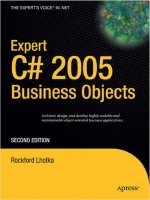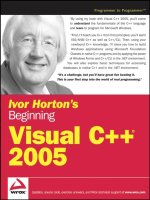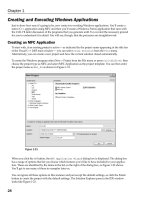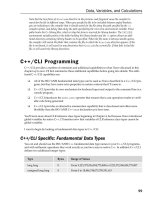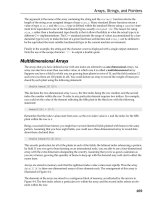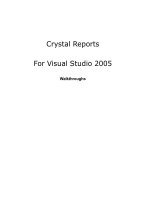Ivor Horton’s Beginning Visual C++ 2005 phần 1 ppsx
Bạn đang xem bản rút gọn của tài liệu. Xem và tải ngay bản đầy đủ của tài liệu tại đây (2.13 MB, 123 trang )
Ivor Horton’s
Beginning Visual C++
®
2005
Ivor Horton
01_571974 ffirs.qxp 1/20/06 11:22 PM Page iii
01_571974 ffirs.qxp 1/20/06 11:22 PM Page ii
Ivor Horton’s
Beginning Visual C++
®
2005
01_571974 ffirs.qxp 1/20/06 11:22 PM Page i
01_571974 ffirs.qxp 1/20/06 11:22 PM Page ii
Ivor Horton’s
Beginning Visual C++
®
2005
Ivor Horton
01_571974 ffirs.qxp 1/20/06 11:22 PM Page iii
Ivor Horton’s Beginning Visual C++
®
2005
Published by
Wiley Publishing, Inc.
10475 Crosspoint Boulevard
Indianapolis, IN 46256
www.wiley.com
Copyright © 2006 by Ivor Horton
Published by Wiley Publishing, Inc., Indianapolis, Indiana
Published simultaneously in Canada
ISBN-13: 978-0-7645-7197-8
ISBN-10: 0-7645-7197-4
Manufactured in the United States of America
10 9 8 7 6 5 4 3 2 1
1B/QY/QS/QW/IN
Library of Congress Cataloging-in-Publication Data:
Horton, Ivor. Ivor Horton’s Beginning Visual C++ 2005 / Ivor Horton. p. cm. Includes
index.
ISBN-13: 978-0-7645-7197-8 (paper/website)
ISBN-10: 0-7645-7197-4 (paper/website)
1. C++ (Computer program language) 2. Microsoft Visual C++. I. Title: Beginning Visual C++
2005. II. Title.
QA76.73.C15I6694 2006
005.13’3—dc22
2005032051
No part of this publication may be reproduced, stored in a retrieval system or transmitted in any form or by any
means, electronic, mechanical, photocopying, recording, scanning or otherwise, except as permitted under Sections
107 or 108 of the 1976 United States Copyright Act, without either the prior written permission of the Publisher, or
authorization through payment of the appropriate per-copy fee to the Copyright Clearance Center, 222 Rosewood
Drive, Danvers, MA 01923, (978) 750-8400, fax (978) 646-8600. Requests to the Publisher for permission should be
addressed to the Legal Department, Wiley Publishing, Inc., 10475 Crosspoint Blvd., Indianapolis, IN 46256, (317)
572-3447, fax (317) 572-4355, or online at />LIMIT OF LIABILITY/DISCLAIMER OF WARRANTY: THE PUBLISHER AND THE AUTHOR MAKE NO
REPRESENTATIONS OR WARRANTIES WITH RESPECT TO THE ACCURACY OR COMPLETENESS OF THE
CONTENTS OF THIS WORK AND SPECIFICALLY DISCLAIM ALL WARRANTIES, INCLUDING WITHOUT
LIMITATION WARRANTIES OF FITNESS FOR A PARTICULAR PURPOSE. NO WARRANTY MAY BE CRE-
ATED OR EXTENDED BY SALES OR PROMOTIONAL MATERIALS. THE ADVICE AND STRATEGIES CON-
TAINED HEREIN MAY NOT BE SUITABLE FOR EVERY SITUATION. THIS WORK IS SOLD WITH THE
UNDERSTANDING THAT THE PUBLISHER IS NOT ENGAGED IN RENDERING LEGAL, ACCOUNTING, OR
OTHER PROFESSIONAL SERVICES. IF PROFESSIONAL ASSISTANCE IS REQUIRED, THE SERVICES OF A
COMPETENT PROFESSIONAL PERSON SHOULD BE SOUGHT. NEITHER THE PUBLISHER NOR THE
AUTHOR SHALL BE LIABLE FOR DAMAGES ARISING HEREFROM. THE FACT THAT AN ORGANIZATION
OR WEBSITE IS REFERRED TO IN THIS WORK AS A CITATION AND/OR A POTENTIAL SOURCE OF FUR-
THER INFORMATION DOES NOT MEAN THAT THE AUTHOR OR THE PUBLISHER ENDORSES THE
INFORMATION THE ORGANIZATION OR WEBSITE MAY PROVIDE OR RECOMMENDATIONS IT MAY
MAKE. FURTHER, READERS SHOULD BE AWARE THAT INTERNET WEBSITES LISTED IN THIS WORK MAY
HAVE CHANGED OR DISAPPEARED BETWEEN WHEN THIS WORK WAS WRITTEN AND WHEN IT IS
READ.
For general information on our other products and services please contact our Customer Care Department within
the United States at (800) 762-2974, outside the United States at (317) 572-3993 or fax (317) 572-4002.
Trademarks: Wiley, the Wiley logo, Wrox, the Wrox logo, Programmer to Programmer, and related trade dress are
trademarks or registered trademarks of John Wiley & Sons, Inc. and/or its affiliates, in the United States and other
countries, and may not be used without written permission. Visual C++ is a registered trademark of Microsoft Cor-
poration in the United States and/or other countries. All other trademarks are the property of their respective
owners. Wiley Publishing, Inc., is not associated with any product or vendor mentioned in this book.
Wiley also publishes its books in a variety of electronic formats. Some content that appears in print may not be
available in electronic books.
01_571974 ffirs.qxp 1/20/06 11:22 PM Page iv
Credits
Executive Editor
Bob Elliott
Senior Development Editor
Kevin Kent
Development Editor
Howard Jones
Technical Editor
John Mueller
Production Editor
Pamela Hanley
Copy Editor
Susan Hobbs
Editorial Manager
Mary Beth Wakefield
Production Manager
Tim Tate
Vice President and Executive Group Publisher
Richard Swadley
Vice President and Executive Publisher
Joseph B. Wikert
Project Coordinator
Ryan Steffen
Graphics and Production Specialists
Brian Drumm
Lauren Goddard
Brooke Graczyk
Denny Hager
Joyce Haughey
Jennifer Heleine
Stephanie D. Jumper
Barry Offringa
Alicia South
Erin Zeltner
Quality Control Technicians
Laura Albert
John Greenough
Leeann Harney
Proofreading
TECHBOOKS Production Services
Indexing
Infodex Indexing Services Inc.
01_571974 ffirs.qxp 1/20/06 11:22 PM Page v
01_571974 ffirs.qxp 1/20/06 11:22 PM Page vi
About the Author
Ivor Horton graduated as a mathematician and was lured into information technology by promises of
great rewards for very little work. In spite of the reality being usually a great deal of work for relatively
modest rewards, he has continued to work with computers to the present day. He has been engaged at
various times in programming, systems design, consultancy, and the management of the implementa-
tion of projects of considerable complexity.
Horton has many years of experience in the design and implementation of computer systems applied to
engineering design and to manufacturing operations in a variety of industries. He also has considerable
experience in developing occasionally useful applications in a wide variety of programming languages,
and of teaching primarily scientists and engineers to do likewise. He has written books on programming
for more than 10 years; his currently published works include tutorials on C, C++, and Java. At the pre-
sent time, when he is not writing programming books or providing advice to others, he spends his time
fishing, travelling, and trying to speak better French.
01_571974 ffirs.qxp 1/20/06 11:22 PM Page ix
This book is dedicated to Alexander Gilbey. I look forward to his comments,
but I’ll probably have to wait a while.
01_571974 ffirs.qxp 1/20/06 11:22 PM Page vii
01_571974 ffirs.qxp 1/20/06 11:22 PM Page viii
01_571974 ffirs.qxp 1/20/06 11:22 PM Page x
Acknowledgments
I’d like to acknowledge the efforts and support of the John Wiley & Sons, and Wrox Press editorial and
production team in the production of this book, especially Senior Development Editor Kevin Kent who
has been there from way back at the beginning and has stayed through to the end. I’d also like to thank
Technical Editor John Mueller for going through the text to find hopefully most of my mistakes, for
checking out all the examples in the book, and for his many constructive comments that helped make
the book a better tutorial.
Finally, I would like to thank my wife, Eve, for her patience, cheerfulness, and support throughout the
long gestation period of this book. As I have said on many previous occasions, I could not have done it
without her.
01_571974 ffirs.qxp 1/20/06 11:22 PM Page xi
01_571974 ffirs.qxp 1/20/06 11:22 PM Page xii
xiii
Contents
Acknowledgments xi
Chapter 1: Programming with Visual C++ 2005 1
The .NET Framework 2
The Common Language Runtime (CLR) 2
Writing C++ Applications 3
Learning Windows Programming 4
Learning C++ 5
The C++ Standards 5
Console Applications 6
Windows Programming Concepts 6
What Is the Integrated Development Environment? 8
Components of the System 9
The Editor 9
The Compiler 9
The Linker 9
The Libraries 9
Using the IDE 10
Toolbar Options 10
Dockable Toolbars 12
Documentation 12
Projects and Solutions 13
Defining a Project 13
Debug and Release Versions of Your Program 19
Dealing with Errors 23
Setting Options in Visual C++ 2005 27
Creating and Executing Windows Applications 28
Creating an MFC Application 28
Building and Executing the MFC Application 30
Creating a Windows Forms Application 31
Summary 35
02_571974 ftoc.qxp 1/20/06 11:22 PM Page xiii
xiv
Contents
Chapter 2: Data, Variables, and Calculations 37
The Structure of a C++ Program 38
Program Comments 44
The #include Directive — Header Files 45
Namespaces and the Using Declaration 46
The main() Function 46
Program Statements 47
Whitespace 49
Statement Blocks 49
Automatically Generated Console Programs 50
Defining Variables 51
Naming Variables 51
Keywords in C++ 52
Declaring Variables 52
Initial Values for Variables 53
Fundamental Data Types 54
Integer Variables 54
Character Data Types 55
Integer Type Modifiers 56
The Boolean Type 57
Floating-Point Types 57
Fundamental Types in ISO/ANSI C++ 58
Literals 59
Defining Synonyms for Data Types 60
Variables with Specific Sets of Values 60
Specifying the Type for Enumeration Constants 62
Basic Input/Output Operations 62
Input from the Keyboard 62
Output to the Command Line 63
Formatting the Output 64
Escape Sequences 65
Calculating in C++ 67
The Assignment Statement 67
Understanding Lvalues and Rvalues 68
Arithmetic Operations 68
The const Modifier 70
Constant Expressions 70
Program Input 71
Calculating the Result 71
Displaying the Result 73
Calculating a Remainder 73
02_571974 ftoc.qxp 1/20/06 11:22 PM Page xiv
xv
Contents
Modifying a Variable 73
The Increment and Decrement Operators 74
The Sequence of Calculation 77
Operator Precedence 77
Variable Types and Casting 78
Rules for Casting Operands 78
Casts in Assignment Statements 79
Explicit Casts 80
Old-Style Casts 81
The Bitwise Operators 81
The Bitwise AND 82
The Bitwise OR 84
The Bitwise Exclusive OR 85
The Bitwise NOT 86
The Bitwise Shift Operators 86
Understanding Storage Duration and Scope 88
Automatic Variables 88
Positioning Variable Declarations 91
Global Variables 91
Static Variables 94
Namespaces 95
Declaring a Namespace 96
Multiple Namespaces 98
C++/CLI Programming 99
C++/CLI Specific: Fundamental Data Types 99
C++/CLI Output to the Command Line 104
C++/CLI Specific — Formatting the Output 104
C++/CLI Input from the Keyboard 107
Using safe_cast 108
C++/CLI Enumerations 109
Specifying a Type for Enumeration Constants 111
Specifying Values for Enumeration Constants 111
Summary 112
Exercises 113
Chapter 3: Decisions and Loops 115
Comparing Values 115
The if Statement 117
Nested if Statements 118
The Extended if Statement 120
Nested if-else Statements 122
02_571974 ftoc.qxp 1/20/06 11:22 PM Page xv
xvi
Contents
Logical Operators and Expressions 124
Logical AND 125
Logical OR 125
Logical NOT 126
The Conditional Operator 127
The switch Statement 129
Unconditional Branching 132
Repeating a Block of Statements 132
What Is a Loop? 132
Variations on the for Loop 135
Using the continue Statement 139
Floating-Point Loop Counters 143
The while Loop 143
The do-while Loop 146
Nested Loops 147
C++/CLI Programming 150
The for each Loop 153
Summary 156
Exercises 157
Chapter 4: Arrays, Strings, and Pointers 159
Handling Multiple Data Values of the Same Type 160
Arrays 160
Declaring Arrays 161
Initializing Arrays 164
Character Arrays and String Handling 166
String Input 167
Multidimensional Arrays 169
Initializing Multidimensional Arrays 170
Indirect Data Access 172
What Is a Pointer? 172
Declaring Pointers 173
The Address-Of Operator 173
Using Pointers 174
The Indirection Operator 174
Why Use Pointers? 174
Initializing Pointers 176
Pointers to char 177
The sizeof Operator 181
Constant Pointers and Pointers to Constants 183
02_571974 ftoc.qxp 1/20/06 11:22 PM Page xvi
xvii
Contents
Pointers and Arrays 185
Pointer Arithmetic 185
Using Pointers with Multidimensional Arrays 190
Pointer Notation with Multidimensional Arrays 191
Dynamic Memory Allocation 192
The Free Store, Alias the Heap 192
The new and delete Operators 193
Allocating Memory Dynamically for Arrays 194
Dynamic Allocation of Multidimensional Arrays 196
Using References 197
What Is a Reference? 197
Declaring and Initializing References 197
C++/CLI Programming 198
Tracking Handles 199
Declaring Tracking Handles 199
CLR Arrays 200
Sorting One-Dimensional Arrays 205
Searching One-Dimensional Arrays 206
Multidimensional Arrays 209
Arrays of Arrays 213
Strings 216
Joining Strings 217
Modifying Strings 220
Searching Strings 222
Tracking References 225
Interior Pointers 225
Summary 228
Exercises 230
Chapter 5: Introducing Structure into Your Programs 231
Understanding Functions 232
Why Do You Need Functions? 233
Structure of a Function 233
The Function Header 233
The Function Body 234
The return Statement 235
Using a Function 235
Function Prototypes 235
Passing Arguments to a Function 239
The Pass-by-value Mechanism 240
Pointers as Arguments to a Function 241
02_571974 ftoc.qxp 1/20/06 11:22 PM Page xvii
xviii
Contents
Passing Arrays to a Function 243
Passing Multi-Dimensional Arrays to a Function 245
References as Arguments to a Function 247
Use of the const Modifier 249
Arguments to main() 250
Accepting a Variable Number of Function Arguments 252
Returning Values from a Function 254
Returning a Pointer 254
A Cast Iron Rule for Returning Addresses 256
Returning a Reference 258
A Teflon-Coated Rule: Returning References 260
Static Variables in a Function 260
Recursive Function Calls 262
Using Recursion 264
C++/CLI Programming 265
Functions Accepting a Variable Number of Arguments 266
Arguments to main() 267
Summary 268
Exercises 269
Chapter 6: More about Program Structure 271
Pointers to Functions 271
Declaring Pointers to Functions 272
A Pointer to a Function as an Argument 275
Arrays of Pointers to Functions 277
Initializing Function Parameters 277
Exceptions 279
Throwing Exceptions 281
Catching Exceptions 282
Exception Handling in the MFC 283
Handling Memory Allocation Errors 284
Function Overloading 285
What Is Function Overloading? 286
When to Overload Functions 288
Function Templates 288
Using a Function Template 289
An Example Using Functions 291
Implementing a Calculator 291
Analyzing the Problem 292
Eliminating Blanks from a String 294
Evaluating an Expression 295
02_571974 ftoc.qxp 1/20/06 11:22 PM Page xviii
xix
Contents
Getting the Value of a Term 298
Analyzing a Number 299
Putting the Program Together 302
Extending the Program 304
Extracting a Substring 305
Running the Modified Program 307
C++/CLI Programming 308
Understanding Generic Functions 309
Defining Generic Functions 309
Using Generic Functions 310
A Calculator Program for the CLR 315
Removing Spaces from the Input String 316
Evaluating an Arithmetic Expression 316
Obtaining the Value of a Term 318
Evaluating a Number 318
Extracting a Parenthesized Substring 319
Summary 320
Exercises 321
Chapter 7: Defining Your Own Data Types 323
The struct in C++ 324
What Is a struct? 324
Defining a struct 324
Initializing a struct 325
Accessing the Members of a struct 325
Intellisense Assistance with Structures 329
The struct RECT 330
Using Pointers with a struct 330
Accessing Structure Members through a Pointer 332
The Indirect Member Selection Operator 332
Data Types, Objects, Classes and Instances 332
First Class 334
Operations on Classes 334
Terminology 335
Understanding Classes 335
Defining a Class 336
Access Control in a Class 336
Declaring Objects of a Class 336
Accessing the Data Members of a Class 337
Member Functions of a Class 339
02_571974 ftoc.qxp 1/20/06 11:22 PM Page xix
xx
Contents
Positioning a Member Function Definition 341
Inline Functions 342
Class Constructors 343
What Is a Constructor? 343
The Default Constructor 345
Assigning Default Parameter Values in a Class 347
Using an Initialization List in a Constructor 350
Private Members of a Class 350
Accessing private Class Members 353
The friend Functions of a Class 354
Placing friend Function Definitions Inside the Class 356
The Default Copy Constructor 356
The Pointer this 358
const Objects of a Class 360
const Member Functions of a Class 361
Member Function Definitions Outside the Class 362
Arrays of Objects of a Class 363
Static Members of a Class 364
Static Data Members of a Class 365
Static Function Members of a Class 367
Pointers and References to Class Objects 368
Pointers to Class Objects 368
References to Class Objects 371
Implementing a Copy Constructor 371
C++/CLI Programming 372
Defining Value Class Types 373
The ToString() Function in a Class 376
Literal Fields 377
Defining Reference Class Types 378
Class Properties 381
Defining Scalar Properties 382
Trivial Scalar Properties 384
Defining Indexed Properties 388
More Complex Indexed Properties 392
Static Properties 393
Reserved Property Names 394
initonly Fields 394
Static Constructors 396
Summary 396
Exercises 397
02_571974 ftoc.qxp 1/20/06 11:22 PM Page xx
xxi
Contents
Chapter 8: More on Classes 399
Class Destructors 399
What Is a Destructor? 399
The Default Destructor 400
Destructors and Dynamic Memory Allocation 402
Implementing a Copy Constructor 405
Sharing Memory Between Variables 407
Defining Unions 408
Anonymous Unions 409
Unions in Classes and Structures 410
Operator Overloading 410
Implementing an Overloaded Operator 411
Implementing Full Support for an Operator 414
Overloading the Assignment Operator 418
Fixing the Problem 418
Overloading the Addition Operator 423
Overloading the Increment and Decrement Operators 426
Class Templates 427
Defining a Class Template 428
Template Member Functions 430
Creating Objects from a Class Template 431
Class Templates with Multiple Parameters 434
Using Classes 436
The Idea of a Class Interface 436
Defining the Problem 436
Implementing the CBox Class 437
Comparing CBox Objects 438
Combining CBox Objects 439
Analyzing CBox Objects 441
Defining the CBox Class 445
Adding Data Members 446
Defining the Constructor 447
Adding Function Members 448
Adding Global Functions 453
Using Our CBox Class 455
Organizing Your Program Code 458
Naming Program Files 460
C++/CLI Programming 461
Overloading Operators in Value Classes 461
Overloading the Increment and Decrement Operators 467
Overloading Operators in Reference Classes 467
Summary 470
Exercises 471
02_571974 ftoc.qxp 1/20/06 11:22 PM Page xxi
xxii
Contents
Chapter 9: Class Inheritance and Virtual Functions 473
Basic Ideas of OOP 473
Inheritance in Classes 475
What Is a Base Class? 475
Deriving Classes from a Base Class 476
Access Control Under Inheritance 479
Constructor Operation in a Derived Class 482
Declaring Class Members to be Protected 486
The Access Level of Inherited Class Members 489
The Copy Constructor in a Derived Class 490
Class Members as Friends 495
Friend Classes 496
Limitations on Class Friendship 496
Virtual Functions 497
What Is a Virtual Function? 499
Using Pointers to Class Objects 501
Using References With Virtual Functions 503
Incomplete Class Definitions 504
Pure Virtual Functions 505
Abstract Classes 505
Indirect Base Classes 508
Virtual Destructors 511
Casting Between Class Types 516
Nested Classes 516
C++/CLI Programming 520
Inheritance in C++/CLI Classes 520
Interface Classes 526
Defining Interface Classes 527
Classes and Assemblies 531
Visibility Specifiers for Classes and Interfaces 531
Access Specifiers for Class and Interface Members 531
Functions Specified as new 536
Delegates and Events 536
Declaring Delegates 537
Creating Delegates 537
Unbound Delegates 541
Creating Events 545
Destructors and Finalizers in Reference Classes 549
Generic Classes 551
Generic Interface Classes 554
Generic Collection Classes 555
Summary 561
Exercises 562
02_571974 ftoc.qxp 1/20/06 11:22 PM Page xxii

